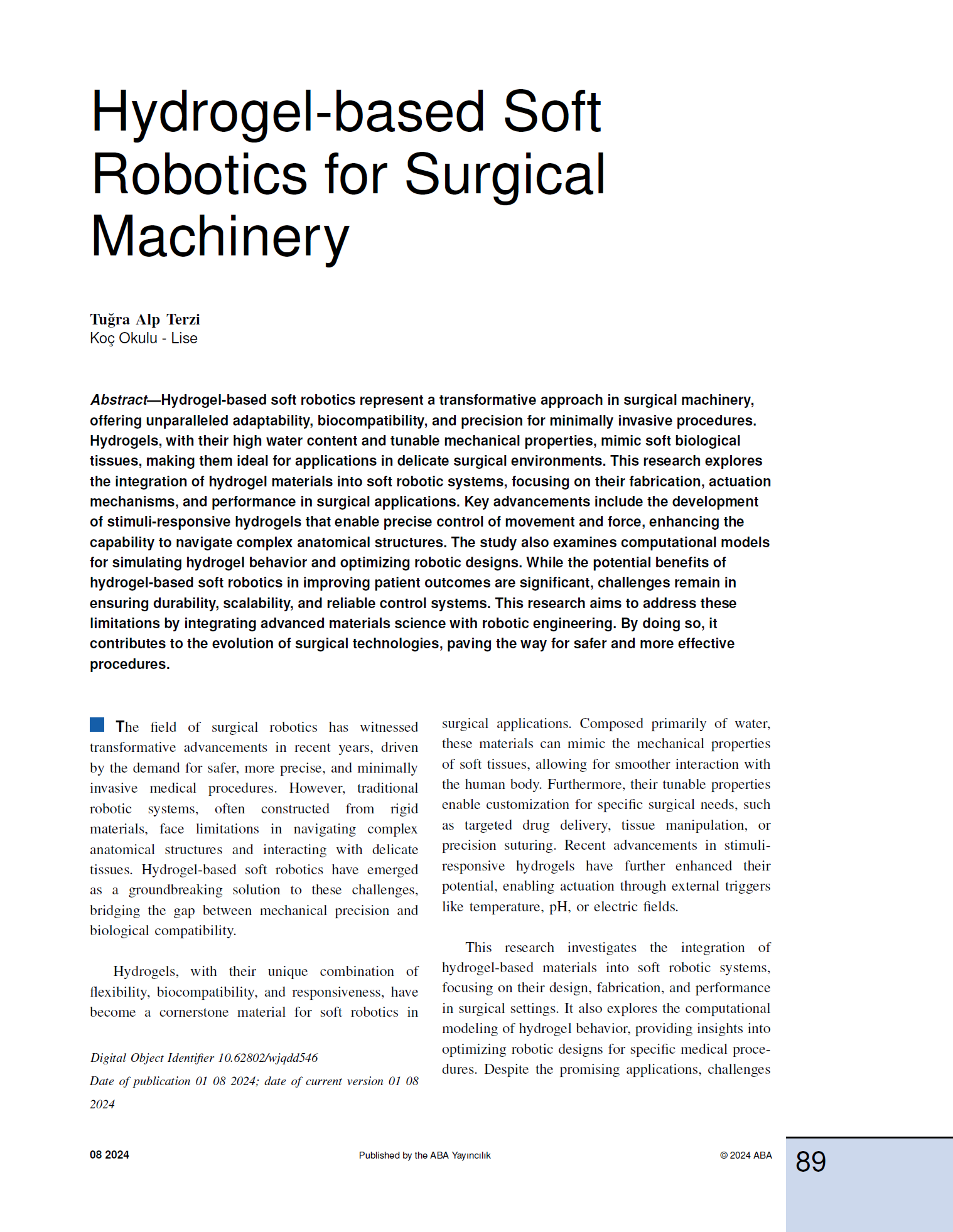Hydrogel-based Soft Robotics for Surgical Machinery
DOI:
https://doi.org/10.62802/mg747v71Keywords:
Hydrogel-based soft robotics, surgical machinery, biocompatibility, minimally invasive surgery, stimuli-responsive hydrogels, robotic actuation, computational modeling, surgical innovationAbstract
Hydrogel-based soft robotics represent a transformative approach in surgical machinery, offering unparalleled adaptability, biocompatibility, and precision for minimally invasive procedures. Hydrogels, with their high water content and tunable mechanical properties, mimic soft biological tissues, making them ideal for applications in delicate surgical environments. This research explores the integration of hydrogel materials into soft robotic systems, focusing on their fabrication, actuation mechanisms, and performance in surgical applications. Key advancements include the development of stimuli-responsive hydrogels that enable precise control of movement and force, enhancing the capability to navigate complex anatomical structures. The study also examines computational models for simulating hydrogel behavior and optimizing robotic designs. While the potential benefits of hydrogel-based soft robotics in improving patient outcomes are significant, challenges remain in ensuring durability, scalability, and reliable control systems. This research aims to address these limitations by integrating advanced materials science with robotic engineering. By doing so, it contributes to the evolution of surgical technologies, paving the way for safer and more effective procedures.
References
Baniasadi, H., Abidnejad, R., Fazeli, M., Lipponen, J., Niskanen, J., Kontturi, E., ... & Rojas, O. J. (2024). Innovations in hydrogel-based manufacturing: A comprehensive review of direct ink writing technique for biomedical applications. Advances in Colloid and Interface Science, 103095.
Chen, Q., Schott, D., & Jovanova, J. (2024). Model-Based Design of Variable Stiffness Soft Gripper Actuated by Smart Hydrogels. Soft Robotics.
Dahlan, N. A., Ibrahim, F., & Teow, S. Y. (2024). Hydrogels with Magnetic Properties. In Multifunctional Hydrogels (pp. 157-173). CRC Press.
Kamini, & Puri, D. (2024). Hydrogel-based drug delivery systems-a review. Polymer-Plastics Technology and Materials, 63(16), 2213-2236.
Li, B., Yang, X., Chen, H., Xu, C., & Wang, X. (2024). Flexible tactile sensing of magnetic hydrogel composites based on electrical impedance tomography. Journal of Intelligent Material Systems and Structures, 1045389X241280631.
Nicholls, L., Hardman, D., & Iida, F. (2024, April). Multi-touch Recognition of Hydrogel-based E-skins using Real-world EIT Datasets. In 2024 IEEE 7th International Conference on Soft Robotics (RoboSoft) (pp. 103-108). IEEE.
Pruksawan, S., Chua, Z. A., Chong, Y. T., & Wang, F. (2024, October). Programmable Hydrogel-Based Soft Robotics via Encoded Building Block Design. In Actuators (Vol. 13, No. 10, p. 383). MDPI.
Qu, J., Cui, G., Li, Z., Fang, S., Zhang, X., Liu, A., ... & Wang, X. (2024). Advanced Flexible Sensing Technologies for Soft Robots. Advanced Functional Materials, 2401311.
Song, W., Li, L., Liu, X., Zhu, Y., Yu, S., Wang, H., & Wang, L. (2024). Hydrogel microrobots for biomedical applications. Frontiers in Chemistry, 12, 1416314.
Wang, Y., Xie, Z., Huang, H., & Liang, X. (2024). Pioneering healthcare with soft robotic devices: A review. Smart Medicine, 3(1), e20230045.









